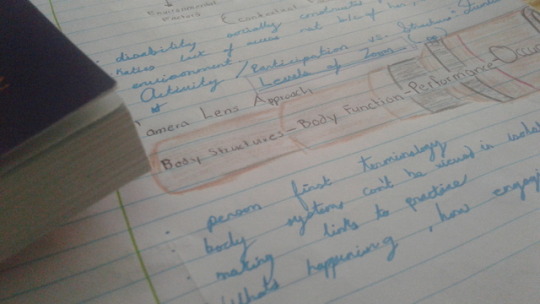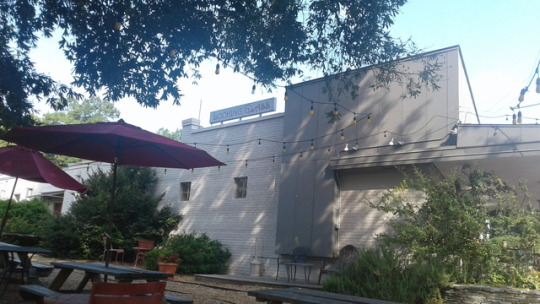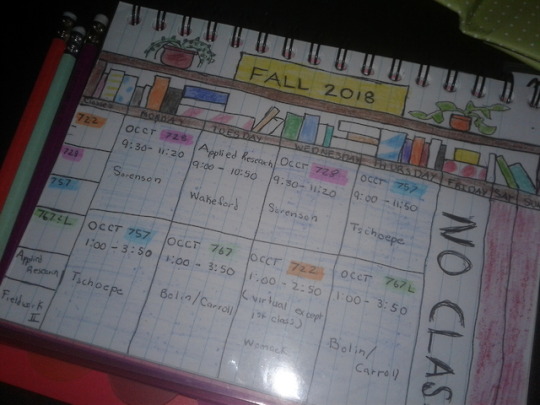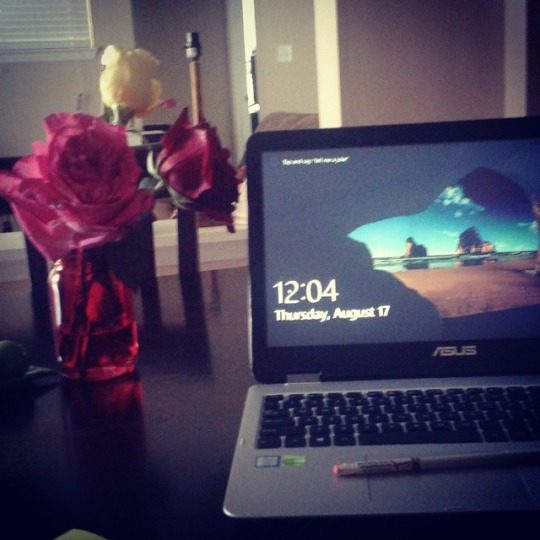#otblog
Photo


Makers Space
Last semester, we had an assignment where we were asked to create an item for our pediatric fieldwork (FW) level l site. My supervisor was teaching several of her students how to type. So she asked if I could create something that would hold their papers up, next to their laptops or tablets, so that it would prevent the constant looking up and down from their paper, to their device. For one of my last sessions at the school, I got to see my supervisor incorporate these objects I made with her students! It was nice to see all my hard work and problem solving being put to use!
Today, we learned about OT’s role in working with patients with burn injuries. Our guest speaker talked about the different dressings, compression gear, etc... that their patients require during their recovery process. Then she brought up the fact that her specific burn center, hand-makes and customizes all their patient’s gear!
As OTs, we are makers. We’re creative problem -solvers. We analyze tasks/activities, we identify where the break down is occurring, and then with our clients, we create or adapt routines, materials, roles to allow our clients to get back to the things they love!
I’ve realized that during my free time (no matter how small it may be) I must exercise my creativity. I must make for fun. I must problem solve in my own daily life. It’s the best way to refine my skills.
So, what do you like to make? Where does your creativity lie?
27 notes
·
View notes
Text
Welcome!
Hello, and welcome to our blog, Sincerely OT! We are 4 second year occupational therapy students from Kean University and are excited to share our thoughts with you on all things OT!
We hope that this blog will be a resource for occupational therapy students, OT practitioners, people interested in the field and anyone else in the world wanting to learn more about OT!
So get comfortable, and come along with us for the ride. We all have time on our hands now with all that social distancing going on! ;)
Stay well!
Sincerely, OT
P.S. We’d love to hear from you! Don’t be shy...leave us a question or comment! :)
#occupationaltherapy#ot#washyourhands#ots#socialdistancing#occupational therapy#social distancing#wash your hands#otschool otblog
1 note
·
View note
Text
Mind the gap.
This weeks topic made me slightly chuckle. ‘Putting theory learned in class into practice’. What a controversial question. As subjective as they come. I mean. Theory is easy to learn and regurgitate right however understanding the meaning of it and putting it into practise is a whole other ball game.
I think many factors contribute to how successful it actually is to put theory into practise.The small matter of the way the theory was taught (i.e. the lecturer). Honestly - thats the bottom line. New concepts require excellent explanations and to be fair we do get them but there are the odd occasion that lets us down and its left to us students to try and figure out whats what. To some extent it can be argued thats a leaning curve in it self and the famous, ‘we don't spoon feed in university as they do in school’ applies here. BUT, theres a difference in further researching AND trying to teach yourself new concepts when we expect more - especially with the price of education (for political sake- fees must fall).
So what Im trying to say it, my experience of putting theory into practise is far from easy and I personally feel like everything I learnt and continue to learn is from my supervisor on site during prac. Theory is well and good and it lays the foundation for a solid background but to have it stated on a powerpoint, things like definitions and empty bullets with one words when describing treatment i.e. splinting makes NO difference on prac when we assessing a patient and thinking of treatment. I personally have never found it useful to refer to my notes when I needed clarification as it often lacks it. Im ever grateful for my supervisor as she eases my fears and answers my questions. AND most importantly teaches me despite it being a high pressured environment where both patients lives are in our hands as well my marks are being given but realises it isn't just about marks but its about listening to the student and giving them a chance to voice their concern and answering accordingly.
Definitions and concrete explanations are lovely in the notes and important to know which is a positive however I do find it difficult to move from theory which is just 50 + slides to an actual 50+ year old human that is an amputee who also suffered a stroke is front of me. WHERE ARE THE NOTES THERE? Its not on moodle! And again it will be argued , ‘we can't teach you everything in the limited time we have available’ but honestly I don't buy that. Spend a little more time doing and seeing practically then reading off a powerpoint for 5 periods. I mean, come on, 225 minutes :|
So Im pretty sure I do not need to reiterate my feelings about how does it feel to put theory into practice? :)
This week was really weird as I did attend Tuesday prac due to a health issue and hence resumed on Friday. I had planned to do a grooming session with my client followed by continued assessments. However upon my arrival the client was fast asleep in bed due to his postural hypotension - he kept on feeling dizzy which prevented him getting up. I tried getting him in his chair once however it proved unsuccessful and he felt dizzy again and needed to be lied down. Unfortunately treatment and neither could assessment continue due to the client sleeping for the nature morning. I received a new client however very late and I just managed to observe her in her already scheduled therapy sessions. Lesson learnt is a very important precaution regarding his health needs to be always taken and managed accordingly in future weeks.
In conclusion, the OT department is lovely and informative and at the end of the day its up to the everyone individually on how they learn and understand best and its up to everyone to make the effort if they are struggling which I endeavour too but naturally sometimes fall short.
0 notes
Photo

Hey friends!
I have been MIA due to the fact that I started my first fieldwork level 2 placement 6 weeks ago! I know, that’s absolutely wild! My previous semester was a whirlwind of emotions as we crammed 6 months of adult related content into 7.5 weeks! I have always considered myself a future pediatric OT, but after my adult semester I am open to a wider age range; however, my current placement is at an outpatient pediatric clinic! Here are some thoughts from my first week:
1) Something that is as I expected:
I am currently at a private clinic. Based on what I knew from previous volunteer and shadowing experiences, I expected two things. The first one being that the caseload would be large. Outpatient OTs get paid per visit, so their goal is to tack on as many visits on their schedule as possible. This is very true for my setting. My fieldwork educator has anywhere from 30-35 kids on her caseload! And I met at least 30 by the end of my first week.
The second thing I expected corresponds with the first. I expected long hours because of the large caseload. I was right! Long hours or not, though, I had already fallen in love with the flexibility of the setting, and the range of clients we see on a daily basis!
2) Something that surprised me:
When starting at the clinic I came in hesitantly, because I had been told by several people that pediatric outpatient clinics are heavily saturated with SI/ sensory based intervention. So much so, that sensory-based intervention tends to be the focus, and the occupations of the children being treated tend to get lost in the shuffle. Also, there is still the question of evidence, and the correct implementations of SI specific interventions. However, after a week at the clinic, my fears were quickly put to rest! Interventions here are directly relevant to each child and their family. The uniqueness of this setting allows for parents to be as involved as they would like. Careful time is spent communicating with both the children and families about goals that are important to each of them. Some of the goals addressed in the clinic are very similar to goals I've seen in the school setting. We work on visual motor integration, fine motor precision, and so on, but it's always within the context of specific occupations. We also work on a lot of self-care goals, social skills goals, and feeding. Basically, in 1 week, I felt like I had already seen so much variety! Sensory-based intervention definitely plays a large and important role in this clinic, but it is done right among other things!
3) Something I’m curious about:
At this point in fieldwork, I was curious about some of the other professionals represented at the clinic. MY clinic has OT, PT, SLP, psychological services, and education specialists. I asked upfront if co-treating was common among the different professions represented. My supervisor made it clear that while OT and speech generally co-treat together, OT/PT co-treats were rare, and other types of team-ups generally didn't happen due to scheduling conflicts. This was surprising to me, because a lot of them shared various clients. So I wanted to know more about how treatment went with the other professions represented.
Til next time
-Rocky
6 notes
·
View notes
Photo

Today marks the last day, of my first year of OT school! While I may have doubted it in the smaller moments, today I realized how much my cohort and I have learned! It feels surreal that I am officially a 2nd year OT student now! We have already began the process of ushering in the new 1st year students. Looking back on this year, I realize how quickly our time together has gone, and in another year, I will be done! Cherish these times my friends! Cherish this space that is provided with the intention to nuture growth and learning. Before you know it, we will be out in the real world, OT toolbox in our minds, ready to trail blaze through challenges and change the world one moment at a time. Use this learning time to make mistakes, ask questions, and explore outside your comfort zone! With that in mind, although school is out for the summer, my goal is to upload at least once a week about new OT student info. I will try to cover topics I haven't already! If you have anything you would like to ask, shoot me a direct message with questions! I would be happy to do a Q&A if there is any interest! Til next time! -Rocky
2 notes
·
View notes
Text
Reclaiming Your Narrative
From the UNC Annual Minorty Health Conference: Today I am surrounded by students, educators, and professionals as we focus on the discussion of Public Health, and how it relates to the experiences of minorities and a variety of people groups who feel marginalized.
It has been a day full of talks and sessions, but honeslty the biggest takeaway (although it’s very simple) is that people need to be treated like people. As a future OT practitioner, I hope to remember this simple yet life changing truth. People just want to know we care and that we are willing to meet them as they are, where they are.
Til next time
-Rocky
3 notes
·
View notes
Text
Mental Health
This week has been ENLIGHTENING. I spent my week in an inpatient psych unit in a hospital. I have a while new outlook on psychosocial health and its importance.
Of course I knew mental health is important. But there is something very different when I came face to face with fellow peers and colleagues and learned about their struggles. I realized it could be any one of us.
Many of these clients have similar lives, worries, insecurities common to us. But for them, it has come to a point in life where these insecurities take over all aspects of their lives. So much so, that functioning in terms of what our society deems normal becomes impossible.
As OTs, a lot of what we focus on is increasing or maintaining participation in functional activities important to our clients. But let's begin with mental health! Stats show only 3% of OTs are currently working in the field of mental health, but the need is greater than that.
Just some food for thought.
2 notes
·
View notes
Photo

A Feel for New Material
I have just completed my first week of classes. Let me tell you, the days have been long, but FULL. I feel like I am being showered with occupational goodness, and I am truly so blessed to be in this OT journey!
Today, I wanted to share a little insight into one of my classes. Instead of a typical gross anatomy class, my program offers “Human Capacities.” Chapel Hill places a huge emphasis on the idea of occupation, and what it means to put occupation before structure and function. The class itself is split into two 7 and 1/2 week sessions. Each unit, we focus on a different occupation (or activities of daily living) and the anatomy and physiology that relates to that specific function. For ex. A common occupation for most humans is eating. So during the unit of eating, we will study the structure of all the organs involved in the eating process, and the functions that each of these organs complete. With this type of class structure, body systems aren’t taught separately. Instead, the body systems are taught through correlation. The process of eating involves the digestive system, the nervous system, the cardiovascular system, etc. All these things integrate and work together to allow a person to eat. If one organ or function is hindered in any way, the entire activity of eating can be altered.
I truly love this method of teaching, and I cannot wait to learn about a variety of occupations this way. I believe this gives anatomy and physiology a more humanistic view. It emphasizes that a patient is more than a damaged nerve, or a severed tongue, they are still human. A sum or many pieces, not defined by any one part.
-Rocky
7 notes
·
View notes
Photo



A Space To Call Your Own
Graduate school is no joke. There is a lot more reading, writing, research, and in general a lot more content to grapple with. When I first got to school, I knew that in order to be successful, I had to find a space where I could get things done. Know what I mean? My new apartment is cute and cozy, and usually I try to study either in my living room or bedroom, but that can lead to distractions. And according to my “Human Capacities” professor, the bedroom is not for studying. It’s for sleep and sex, period. So where do I go from there?
The first week of class was all about settling down into a new place, new routine, and new occupations. But it was also really important that I find the perfect study spot. Thankfully, I had some friends who have been living in this area for a while, and they gave me a list of places to check out. The cute cafe pictured above was the first place on the list, but the moment I stepped foot onto its gravel path, I knew it was the place for me. The atmosphere was just right, there was the perfect amount of background noise, and a variety of options for seating inside and outside (perfect for changing weather conditions). In this little town that I currently reside in, there are lots of places like this, but when you know, you just know. I lugged my textbooks and notes to the little cafe one carefree Friday morning with a burdened mind. “Man I have so much work to do! Am I ever going to finish these tedious readings about the anatomy of the brain?” But the moment I took the first sip of my mocha latte and heard the playful conversations rummaging around me, I knew I had found my spot.
To be fair, I tried out the other places on my list, but my heart had already found a home. And now every weekend, I enthusiastically pack up my backpack and head to my favorite spot in town. I guess I said all that to say this, take the time to find your place. Studying doesn’t have to be a chore. Find an environment that makes you happy, one that helps you thrive, and then get to work!
-Rocky
1 note
·
View note
Text
What About the Adolescents?
When most people think of OT in a school setting, their brains jump to preschool or elementary aged children. Again insert handwriting stereotype here.
But occupational therapy in schools means OT for middle and high schoolers too. However, this isn't a common setting choice. In class one day last week, we tried to figure out why this was the case? Do OTs simply not enjoy working with pre-teens/teenagers? Is there an unspoken rule of giving up on a student once he or she reaches a certain age?
Eventually our professor left us with a statement that has been swirling in my mind ever since. She said, "I think the problem is that the system of OT is having a hard time defining occupations in middle and high school settings." She continued to explain that once a student moves to middle/ high school, their occupations change. They become involved in extracurricular activities like sports, band, clubs, or organizations. Teachers set higher expectations, and there's an added focus on transitioning to adulthood. In schools, OT is limited to educationally relevant occupations. Are these added occupations relevant to a student's academic success?
The obvious answer is YES! These extracurricular activities and higher expectations are a part of a student's school experience. Many of these activities set the foundational skills that kickstart a student's transition to adulthood. Educational relevance does not limit our scope of practice. It simply asks us to be creative.
What does that mean for OT? It means working in a school may require us to relinquish our idea of 7am-3pm day of pull-outs; instead, it means we stay behind to set up support so that a student can participate in afterschool band practice. It means we may host cafeteria-based lunch groups where we work on social skills and healthy mealtimes. It means participating in weekend professional development events to ensure students have opportunities to practice interview skills, and try out appropriate dress attire, and so on and so forth!
OT is an extremely flexible field! It just takes a willingness to be creative and shape our practice to be the most beneficial to the people we serve, no matter what setting we end up in.
Til next time

#rockinot
0 notes
Quote
I can tell school has started. The world is awake and noisy outside.
0 notes
Photo

My Fall 2018 Schedule is IN!
Of course, like the little nerd that I am, I have already bought my school supplies and decorated the first page of my notebook with my schedule. I am not ashamed!
This semester will be the most unique of the 4 semesters because it’s a minimester. Instead of the usual August- December scheduling, we’ll have class from August-September. Seven and a half weeks of classroom content, assignments, etc... so that in mid-September we can wrap ups school work and then head off to our very first fieldwork level 2!
Fieldwork level 2 is basically the OT version of an internship. We will be gone for 12 weeks. Our assigned supervisor (an occupational therapist) will be helping us put our skills to the test by letting us do some hands on work with evaluations, assessments, and intervention sessions. Eventually, as we become more accustomed to our setting, our supervisor will then share some of his/her caseload with us.
It’s a daunting, yet very exciting time! I cannot wait! I will be at a private pediatric outpatient clinic! You best believe you guys will be along for the ride! Until then, I’ll just keep sharing school news with you as the new semester draws closer!
Til next time
-Rocky
0 notes
Photo




Settling In...
Well, here we go! Classes start in four days. I moved into my new apartment, made some new friends, and found some time to start exploring. All and all everything has been going pretty smoothly.
BUT (And yes there is a but) mixed with the excitement of it all, I have come to a dire revelation. I am broke! Due to the change in zip code, and a new monthly rent payment, I have found that I have to be a lot more cautious and intentional about how I spend my money. Minimalism and simplicity is really big on the web right now, so I have been checking out some blogs and pins about living comfortably, while maintaining simplicity.
Any ideas? If so send me a direct message either here or on my new OT inspired instagram page: https://www.instagram.com/rockinot/
I promise I don’t bite. Once classes start next week, I will be documenting as much of the OT life as my schedule allows. That means studying, content we go over in class, new friends I make, places I have been able to explore, etc... Stay along for the ride!
Til next time
-Rocky
0 notes
Photo

Hello Friends!
It has been a LONG time since I have added a post to this site. I have to apologize! I had hoped to have more time to relax and post cool things, but alas I have been busier than ever! I guess that’s just what happens once you’re an adult. I hope all is well with you guys.
My program has the summer off, so I have been spending my time nannying/babysitting and using long weekends to vacation with family and friends, while also enjoying a little time to myself.
However, during the 3rd-4th week in June, I had the chance to volunteer with an amazing camp called “Helping Kids with Hemiplegia.” It’s a CIMT (Constraint Induced Movement Therapy) and BMT (Bimanual Therapy) based program.
30-36 kids with hemiplegia are evaluated and chosen to participate in the camp. Once they have been chosen, a cast is made to constrain their less involved arm during camp activities. The first 4 days is strictly CIMT, and the cast is worn at all times except for restroom breaks. The final 4 days of camp includes an alternation between one-hand and bimanual activities, allow each of the campers a chance to practice their skills with awareness of both sides of their body.
The camp is powered by an amazing pair of OT and PT practitioners that have been running the camp for 13 years. Campers are supervised and paired with an undergraduate student looking into OT/PT and a graduate student that is already in an OT/PT program.
This was my first year volunteering at this camp, and if I have it my way, it won’t be the last! I was in awe with all aspects of the camp. It was well planned; the campers are so sweet and full of life; and I got to meet a lot of cool people ranging from experienced practitioners to anxious undergraduate students who wanted to learn more about OT/PT.
I would recommend this camp to anyone who is interested! I have included a link to the camps website.
https://www.uncchildrens.org/uncmc/unc-childrens/care-treatment/therapy/hemiplegia-camp/
I have also learned that there are other camps like it. It was an amazing experience, and I learned a lot of handling/ NDT skills which is just one of many frames of references we learned about last year. I also learned some great skills about being a good therapist, and I got to plan a home exercise program for my camper based on his goals, and the different skills we worked on at camp.
It was a great hands-on experience for me as a budding OT, and I encourage anyone interested in field of rehabilitation to seek out similar experiences.
Til next time!
-Rocky
0 notes
Text
progress = goodbyes
Time is ticking. Days are passing. Clients are ready to move on. BUT, are they moving on in a better or worse space? The all important ‘reflection’ dawns once again upon us. Assessing my clients progress and my role in it - is scary. It defines your skills, abilities and ultimately decides whether one day ( which is rapidly approaching, if not already) will we be worthy of our degree certificates and titles.
My sweet patient, Mr P was being discharged in a few days and my days were numbered with him. I had built such a great relationship with both the client and his family that it made me genuinely sad to say goodbye. The moment that I hugged his wife and asked the rhetorical question of ‘I hope I made a difference and if Mr P enjoyed our sessions?’ , I wondered, did I? Did I actually make a difference? Did the client progress and the answer is YES! ( hallelujah)
Mr P needed extensive therapy both physically and psychologically when he came in and displayed en emotionally labile state upon our initial meeting. The client was emotional and often lacked the motivation to perform therapy. However the client improved drastically in his ADL’s as he went from maximum assistance to minimal assistance - supervision with set up. The client also had the most important factor which is a promoting factor - it being his extremely supportive family that assisted him in getting through the time he spent at the hospital.
I’ll allow myself to be slightly conceited here and just put it out there- that I genuinely believe I had something to do with his the upturn in his mood which subsequently changed his outlook on therapy which ultimately resulted in therapy becoming therapeutic (woah, that sentence sounds pretty smart).The client enjoyed spending time with me and hence enjoyed our sessions together and it warms my heart to know that I did make a difference in his life and helped him in his journey to return home - which he did, on my watch too! (Acknowledging the great work of the rehab unit at Hospital X)
Our final treatment session together. Impromptu sessions :) Toilet transfers it was. It was done to perfect the clients ability in toilet transferring as previously done in a session. The client was able to successfully transfer to the toilet using minimal assistance which was great progress. I needed to position myself for safety purposes in front of the client to prevent falls and facilitate movement at the hips (minimal assistance). The client performed that so well and once it was consolidated - we did self-propelling using the unaffected left upper and lower limb The client needed moderate assistance with this due to the clients unilateral neglect which had improved but still existed and hence required verbal cues to direct the client to prevent him from bumping into anything. This also improved the clients physical endurance from 20 minutes to about 25 minutes.
Progress and goodbyes are closely linked concepts. Goodbyes are usually associated with progress which is inspiring to the next person. Progress of the client can be measured by the therapist’s satisfaction of her progress during their sessions because ultimately it is a learning curve.
0 notes